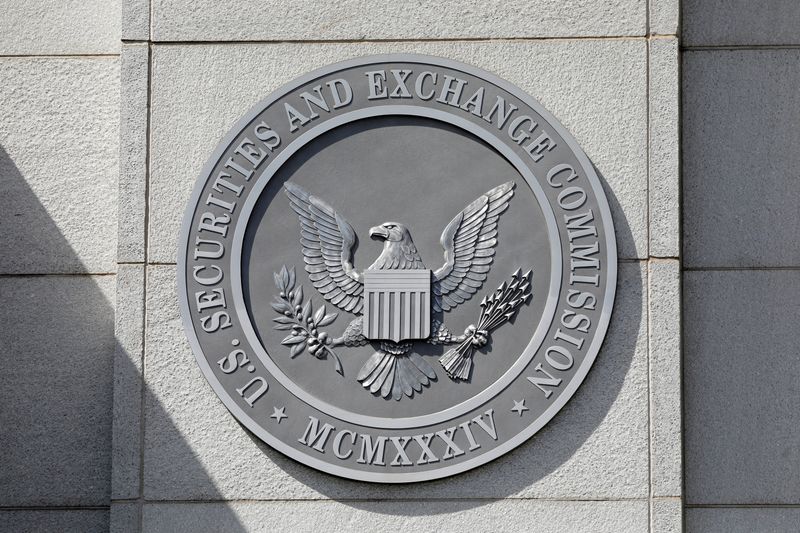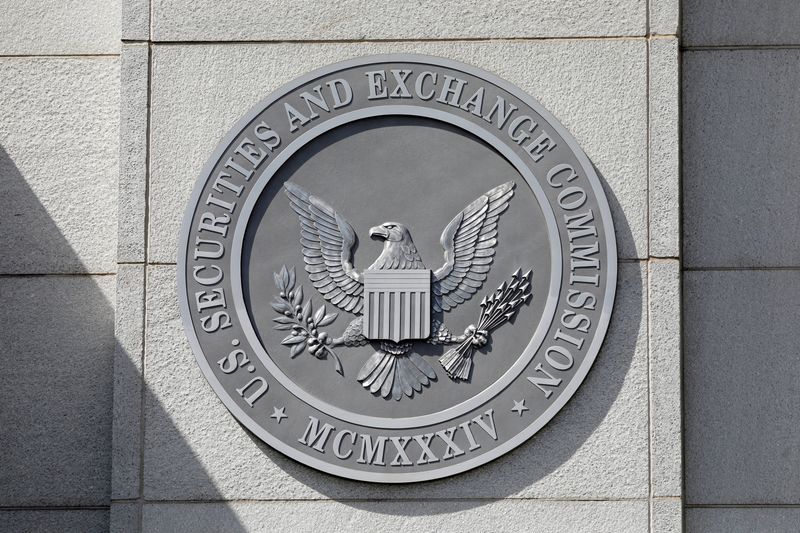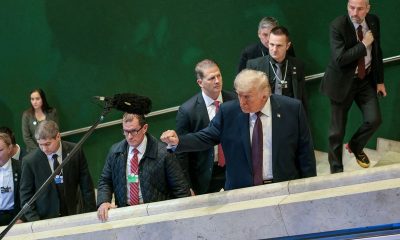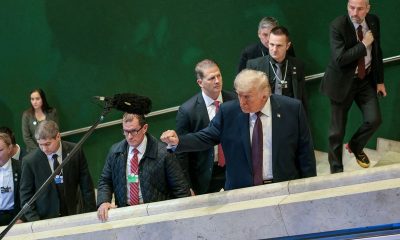Economy
US SEC votes on overhaul for $20 trillion private fund industry


© Reuters. FILE PHOTO: The seal of the U.S. Securities and Exchange Commission (SEC) is seen at their headquarters in Washington, D.C., U.S., May 12, 2021. REUTERS/Andrew Kelly/File Photo
By Carolina Mandl and Chris Prentice
NEW YORK (Reuters) -The U.S. on Wednesday was set to overhaul rules for private equity and hedge fund, but in a victory for the industry, the securities regulator did not make it easier for investors to sue fund managers and it also did not ban arrangements that make it easier for some investors to cash out than others.
The Securities and Exchange Commission’s (SEC) five-member panel will vote on the changes aimed at increasing transparency, fairness and accountability in the private funds industry which has more than doubled its assets over the past decade, agency data shows. Private funds industry manages around $20 trillion in assets.
The new rules would require private funds to issue quarterly fee and performance reports, disclose certain fee structures, and bar giving some investors preferential treatment over redemptions and portfolio exposure. They would also require funds to perform annual audits.
When discussing the changes this morning, SEC Chair Gary Gensler said they would benefit investors in such funds, typically wealthy individuals and institutional investors like pension funds, and companies raising capital from them.
“Today’s final rules will promote private fund advisers’ efficiency, competition, integrity, and transparency,” he said.
Advocacy groups have accused the private fund industry of unfair, conflicted and opaque practices which hurt everyday Americans who invest in such funds through their pensions.
While the changes mark the biggest overhaul of industry rules in years, the SEC rowed back on some contentious proposals after major players, including Citadel and Andreesen Horowitz, argued the agency was overreaching its authority by attempting to bar long-established fee structures and liability terms.
The agency dropped a proposal to bar fees for services that are not performed, such as compliance expenses or costs defending regulatory probes, and scrapped another that would have made it easier for investors to sue funds for misconduct.
Industry groups such as the Managed Funds Association and Alternative Investment Management Association had said those proposals would have increased costs related to liability insurance and prevent fund managers from engaging in certain trades or deals seen as more risky.
The rule would require fund managers to disclose so-called “side letters” – an industry practice through which funds can offer some investors special terms – when they are financially material. Offering some investors special redemption terms or detailed information about portfolio holdings would be outright prohibited.
These SEC rules will only apply to new deals, meaning the industry will not have to re-write all existing contracts as some had feared under the original proposal.
The rules will be effective in 60 days. Some rules will have a staggered adoption, depending on the size of the fund.
Economy
Russian central bank says it needs months to make sure CPI falling before rate cuts -RBC


© Reuters. Russian Central Bank Governor Elvira Nabiullina attends a news conference in Moscow, Russia June 14, 2019. REUTERS/Shamil Zhumatov/File Photo
MOSCOW (Reuters) – Russia’s central bank will need two to three months to make sure that inflation is steadily declining before taking any decision on interest rate cuts, the bank’s governor Elvira Nabiullina told RBC media on Sunday.
The central bank raised its key interest rate by 100 basis points to 16% earlier in December, hiking for the fifth consecutive meeting in response to stubborn inflation, and suggested that its tightening cycle was nearly over.
Nabiullina said it was not yet clear when exactly the regulator would start cutting rates, however.
“We really need to make sure that inflation is steadily decreasing, that these are not one-off factors that can affect the rate of price growth in a particular month,” she said.
Nabiullina said the bank was taking into account a wide range of indicators but primarily those that “characterize the stability of inflation”.
“This will take two or three months or more – it depends on how much the wide range of indicators that characterize sustainable inflation declines,” she said.
The bank will next convene to set its benchmark rate on Feb. 16.
The governor also said the bank should have started monetary policy tightening earlier than in July, when it embarked on the rate-hiking cycle.
Economy
China identifies second set of projects in $140 billion spending plan


© Reuters. FILE PHOTO: Workers walk past an under-construction area with completed office towers in the background, in Shenzhen’s Qianhai new district, Guangdong province, China August 25, 2023. REUTERS/David Kirton/File Photo
SHANGHAI (Reuters) – China’s top planning body said on Saturday it had identified a second batch of public investment projects, including flood control and disaster relief programmes, under a bond issuance and investment plan announced in October to boost the economy.
With the latest tranche, China has now earmarked more than 800 billion yuan of its 1 trillion yuan ($140 billion) in additional government bond issuance in the fourth quarter, as it focuses on fiscal steps to shore up the flagging economy.
The National Development and Reform Commission (NDRC) said in a statement on Saturday it had identified 9,600 projects with planned investment of more than 560 billion yuan.
China’s economy, the world’s second largest, is struggling to regain its footing post-COVID-19 as policymakers grapple with tepid consumer demand, weak exports, falling foreign investment and a deepening real estate crisis.
The 1 trillion yuan in additional bond issuance will widen China’s 2023 budget deficit ratio to around 3.8 percent from 3 percent, the state-run Xinhua news agency has said.
“Construction of the projects will improve China’s flood control system, emergency response mechanism and disaster relief capabilities, and better protect people’s lives and property, so it is very significant,” the NDRC said.
The agency said it will coordinate with other government bodies to make sure that funds are allocated speedily for investment and that high standards of quality are maintained in project construction.
($1 = 7.1315 renminbi)
Economy
Russian central bank says it needs months to make sure CPI falling before rate cuts -RBC


© Reuters. Russian Central Bank Governor Elvira Nabiullina attends a news conference in Moscow, Russia June 14, 2019. REUTERS/Shamil Zhumatov/File Photo
MOSCOW (Reuters) – Russia’s central bank will need two to three months to make sure that inflation is steadily declining before taking any decision on interest rate cuts, the bank’s governor Elvira Nabiullina told RBC media on Sunday.
The central bank raised its key interest rate by 100 basis points to 16% earlier in December, hiking for the fifth consecutive meeting in response to stubborn inflation, and suggested that its tightening cycle was nearly over.
Nabiullina said it was not yet clear when exactly the regulator would start cutting rates, however.
“We really need to make sure that inflation is steadily decreasing, that these are not one-off factors that can affect the rate of price growth in a particular month,” she said.
Nabiullina said the bank was taking into account a wide range of indicators but primarily those that “characterize the stability of inflation”.
“This will take two or three months or more – it depends on how much the wide range of indicators that characterize sustainable inflation declines,” she said.
The bank will next convene to set its benchmark rate on Feb. 16.
The governor also said the bank should have started monetary policy tightening earlier than in July, when it embarked on the rate-hiking cycle.

 Forex4 years ago
Forex4 years agoForex Today: the dollar is gaining strength amid gloomy sentiment at the start of the Fed’s week

 Forex3 years ago
Forex3 years agoUnbiased review of Pocket Option broker

 Forex3 years ago
Forex3 years agoDollar to pound sterling exchange rate today: Pound plummeted to its lowest since 1985

 Forex3 years ago
Forex3 years agoHow is the Australian dollar doing today?

 Cryptocurrency3 years ago
Cryptocurrency3 years agoWhat happened in the crypto market – current events today

 World3 years ago
World3 years agoWhy are modern video games an art form?

 Commodities3 years ago
Commodities3 years agoCopper continues to fall in price on expectations of lower demand in China

 Economy3 years ago
Economy3 years agoCrude oil tankers double in price due to EU anti-Russian sanctions

























